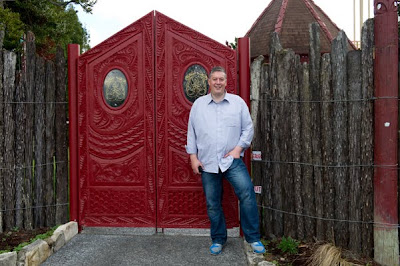Going Home and beyond






I had the rare opportunity the other day to go back to New Zealand, Aotearoa (Maori for land of the long white cloud), land of my forebears where I was able to take some family pictures for some people and also meet and visit with two of my brothers William and Bruce, a sister, Carole and spoke to another sister, Maree on the phone and I stayed with my dear Niece and friend Jules and her fantastic husband and family. I mention this because it was just so nice to mix and mingle with some of the family. My thoughts were in fact around all of the whanau (family in Maori) both those present and those absent.
I love all the members of my family both individually and collectively and it was such a nice chance to be there, albeit briefly. I often feel drawn home and when there realise there are a lot of politics and issues, but through it all, I love them. I love the land there, the history, the culture and heritage. I loved seeing my nieces young children conversing in Maori and was proud to be able to see that the language of New Zealand being embraced by so many people. I was not taught the language, but am honoured that it is now being taught.
I even included a picture of my birth family that I created a few years ago at the top.
I could not believe the differences in the New Zealand economy. Petrol / fuel is $2.20 per litre for 98 Octane unleaded compared to a hovering price in OZ of around $1.51 just to name one thing, the prices are high on lots of things, TV's, food and lots of other items. Generally speaking wages and exchange rates are very similar but I was surprised, and saddened at their high cost of living.
On another note, and in a not so disconnected sense.....
I attended a conference key note address recently where the key note speaker observed that there is a growing discontent within the Australian and New Zealand economies where grave uncertainties about the future prospects for jobs, prosperity and other aspects of life are causing anxiety and depression in many people. It is evidenced at a constant and growing voice of discontent at the leaders of our countries which is getting more prevalent and more verbal and even getting nasty.
The speaker noted his personal concern for the fringe dwellers of society like the mentally ill people, the aged and the people in prisons citing that these areas require lots of funding and maintenance which can have bucket loads of money spent in these areas and have everyone wonder if there were any visible or tangible benefits for the money spent.
This, in an existent lean economy will increase the frustration for those who already suffer. He also cited something I never really gave much thought to previously, the fact that affluence breeds a disengagement from governments. Meaning that when you are not reliant on a government for handouts, or survival, there is also a general malaise about what they do. Further, affluent people, thinking that their money will alleviate and rescue them from the burdens of hand to mouth concerns, live a life that increasingly becomes further and further apart from the masses. The speaker also said, that in lean times the collective conscience suffers.
The built in valve which encourages us to be philanthropic or fair minded and courteous to people in society who are less fortunate dissipates.
Charities too tend to suffer and be stretched in lean times or trouble, recession and depression.
This condition can also cause the affluent to think they are better than "those" people who are less fortunate and are therefore immune and absolved from our collective ability, obligation or desire to help others. The speaker was in Parliament House addressing a number of representatives from charities and members of Parliament from both sides hoping to get a consensus about legislation and a collective understanding to help protect those who are members of our society who suffer.
An incident the speaker referred to was telling. He mentioned one time addressing the Premier of a state within Australia lobbying for money for mental health in the state to which the Premier indicated that he was sympathetic to the funding needs and the plight of people who suffer with these varied conditions. Before the meeting ended the premier pulled out some files from his desk and said to the speaker, I have only $5 million in the overall budget available for a number of things. You raise a good case for mental health needs, here are some schools and other institutions who are also in need, which one do YOU choose, should get the money?
It is an interesting dilemma that people and many families face on a day to day, week to week, month to month basis. Times are tough for a lot of people. Money is tight, patience runs thin, and many people suffer with ills of many descriptions. It is a tough world we live in. My heart goes to those who are not as fortunate, my thoughts are often with the homeless. I never think I am better than others, I KNOW I am not. I am so fortunate, but realise only too well, that a misfortune and a personal reversal of fortune are the only things that separate me from many of them.
We live in a growing world dependent economy that can have ripples that flow throughout the world that will affect the livelihoods and lives of many, over which we have no control. I refer to the economic flow on affects from the Tsunami, or this last week the flooding in Thailand.
I learned today that a competing camera brand suffered severe losses in the Thai floods which could see ripple effects and a global shortage in the supply of cameras for a period of time. There are local concerns in Thailand about their economy, the lives lost, there are concerns for jobs globally in the photographic industry, shops whose main stock supply may be affected adversely, then there is also the amount of people who choose to shop online instead of a bricks and mortar retail shop may also invariably be a major contributing factor when added to the natural disasters that abound.
It is easy for me and others to sit in the wings or in front of a TV and pontificate on what politicians should and shouldn't do to fix the ills of the world, of the country or any other amount of issues but it is hard work. Really hard. Like the contestants on game shows always attest, it is easy at home, in front of the lights, in front of the cameras it is a whole different issue again.
I join with people like Alan Jones however, who on Sydney radio yesterday challenged the Government Minister for resources and energy, The Hon. Chris Hartcher about HIS role in ensuring that Coal Seam Gas mining does NOT happen in key agricultural farmland by trying to hold those who stand to be elected and paid by the public purse to represent the people of the nation, to be more transparent, more decisive and more accountable.
I hope and pray that as the economy continues to move or lurch along, that the voices of hope that I raise my hand to support, will grow louder than the nay sayers who are gathering as qualified doomsday prophets about where we are heading as an economy, country and world.
I live on a knife edge financially at times, but I remain defiant to the trend.
I believe and have the faith in myself, my work, my country and the economy that we will not simply survive, but prosper and rise through it more triumphant than we were previously. I CHOOSE to be positive.
I could not believe the differences in the New Zealand economy. Petrol / fuel is $2.20 per litre for 98 Octane unleaded compared to a hovering price in OZ of around $1.51 just to name one thing, the prices are high on lots of things, TV's, food and lots of other items. Generally speaking wages and exchange rates are very similar but I was surprised, and saddened at their high cost of living.
On another note, and in a not so disconnected sense.....
I attended a conference key note address recently where the key note speaker observed that there is a growing discontent within the Australian and New Zealand economies where grave uncertainties about the future prospects for jobs, prosperity and other aspects of life are causing anxiety and depression in many people. It is evidenced at a constant and growing voice of discontent at the leaders of our countries which is getting more prevalent and more verbal and even getting nasty.
The speaker noted his personal concern for the fringe dwellers of society like the mentally ill people, the aged and the people in prisons citing that these areas require lots of funding and maintenance which can have bucket loads of money spent in these areas and have everyone wonder if there were any visible or tangible benefits for the money spent.
This, in an existent lean economy will increase the frustration for those who already suffer. He also cited something I never really gave much thought to previously, the fact that affluence breeds a disengagement from governments. Meaning that when you are not reliant on a government for handouts, or survival, there is also a general malaise about what they do. Further, affluent people, thinking that their money will alleviate and rescue them from the burdens of hand to mouth concerns, live a life that increasingly becomes further and further apart from the masses. The speaker also said, that in lean times the collective conscience suffers.
The built in valve which encourages us to be philanthropic or fair minded and courteous to people in society who are less fortunate dissipates.
Charities too tend to suffer and be stretched in lean times or trouble, recession and depression.
This condition can also cause the affluent to think they are better than "those" people who are less fortunate and are therefore immune and absolved from our collective ability, obligation or desire to help others. The speaker was in Parliament House addressing a number of representatives from charities and members of Parliament from both sides hoping to get a consensus about legislation and a collective understanding to help protect those who are members of our society who suffer.
An incident the speaker referred to was telling. He mentioned one time addressing the Premier of a state within Australia lobbying for money for mental health in the state to which the Premier indicated that he was sympathetic to the funding needs and the plight of people who suffer with these varied conditions. Before the meeting ended the premier pulled out some files from his desk and said to the speaker, I have only $5 million in the overall budget available for a number of things. You raise a good case for mental health needs, here are some schools and other institutions who are also in need, which one do YOU choose, should get the money?
It is an interesting dilemma that people and many families face on a day to day, week to week, month to month basis. Times are tough for a lot of people. Money is tight, patience runs thin, and many people suffer with ills of many descriptions. It is a tough world we live in. My heart goes to those who are not as fortunate, my thoughts are often with the homeless. I never think I am better than others, I KNOW I am not. I am so fortunate, but realise only too well, that a misfortune and a personal reversal of fortune are the only things that separate me from many of them.
We live in a growing world dependent economy that can have ripples that flow throughout the world that will affect the livelihoods and lives of many, over which we have no control. I refer to the economic flow on affects from the Tsunami, or this last week the flooding in Thailand.
I learned today that a competing camera brand suffered severe losses in the Thai floods which could see ripple effects and a global shortage in the supply of cameras for a period of time. There are local concerns in Thailand about their economy, the lives lost, there are concerns for jobs globally in the photographic industry, shops whose main stock supply may be affected adversely, then there is also the amount of people who choose to shop online instead of a bricks and mortar retail shop may also invariably be a major contributing factor when added to the natural disasters that abound.
It is easy for me and others to sit in the wings or in front of a TV and pontificate on what politicians should and shouldn't do to fix the ills of the world, of the country or any other amount of issues but it is hard work. Really hard. Like the contestants on game shows always attest, it is easy at home, in front of the lights, in front of the cameras it is a whole different issue again.
I join with people like Alan Jones however, who on Sydney radio yesterday challenged the Government Minister for resources and energy, The Hon. Chris Hartcher about HIS role in ensuring that Coal Seam Gas mining does NOT happen in key agricultural farmland by trying to hold those who stand to be elected and paid by the public purse to represent the people of the nation, to be more transparent, more decisive and more accountable.
I hope and pray that as the economy continues to move or lurch along, that the voices of hope that I raise my hand to support, will grow louder than the nay sayers who are gathering as qualified doomsday prophets about where we are heading as an economy, country and world.
I live on a knife edge financially at times, but I remain defiant to the trend.
I believe and have the faith in myself, my work, my country and the economy that we will not simply survive, but prosper and rise through it more triumphant than we were previously. I CHOOSE to be positive.


Comments